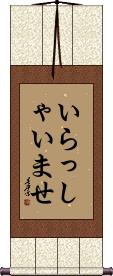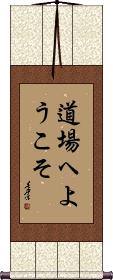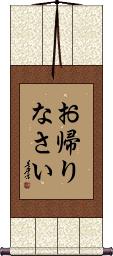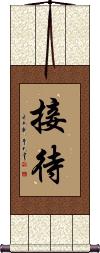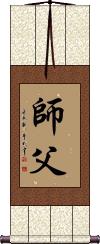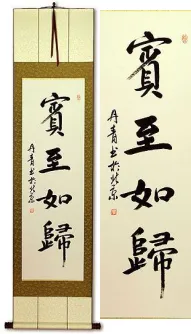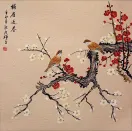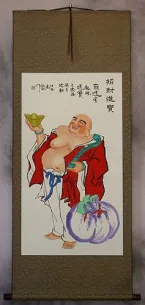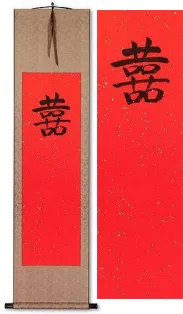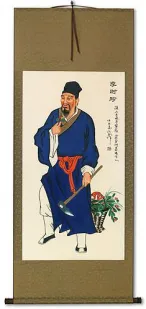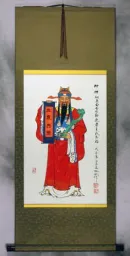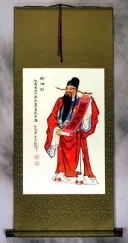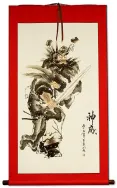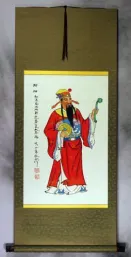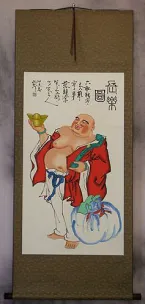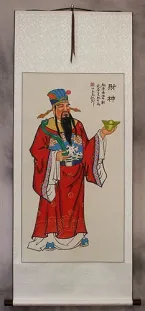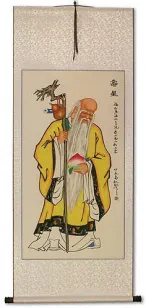Many custom options...
And formats...

Welcome in Chinese / Japanese...
Buy a Welcome calligraphy wall scroll here!
Personalize your custom “Welcome” project by clicking the button next to your favorite “Welcome” title below...
Welcome
いらっしゃいませ is the Japanese greeting that you'll hear just about every time you enter a sushi bar, restaurant, or shop in Japan.
This calligraphy would be appropriate to hang by the entry door of your business or shop.
Note: Because this title is entirely Japanese Hiragana, it should be written by a Japanese calligrapher.
Welcome to the Dojo
A Traditional Warm Welcome
歡迎光臨 would be the ultimate Chinese “welcome mat.” Except it will be on your wall, and people will not step on it.
In a somewhat literal translation, you could say it means “I feel happy as I welcome you, as you have brought a shining light to this place with your arrival,” or more simply, “I am happy you've come as your presents brightens up the place.”
It has become common for this greeting to be announced by the staff upon the arrival of any customer into a fancy store in China. You will also see these characters on the “welcome mats” in front of 4 and 5-star hotels in China.
Having this on a wall scroll is an extra nice touch. I have seen a few horizontal scrolls with this phrase on the wall behind the reception desk of better hotels or near the front door of fine shops. At the fanciest department stores and restaurants in China, several greeters (almost always young women) will stand by the front door, all wearing sashes with this phrase embroidered. As you walk in, they will bow and say “huan ying guang lin” to welcome you to the establishment.
Note: The first two and last two characters do make words in Korean Hanja but are seldom used as a sentence like this in Korean.
Welcome Home
お帰りなさい is a common Japanese way to say, “welcome home.”
This is said by a person greeting another as they return home. It's a typical phrase that is almost said by reflex as part of Japanese courtesy or etiquette.
Sometimes written as 御帰りなさい (just the first character is Kanji instead of Hiragana).
Note: Because this selection contains some special Japanese Hiragana characters, it should be written by a Japanese calligrapher.
Settai
This is the Japanese surname Settai.
This also is a word that means to receive (a visitor), to admit (allow somebody to enter), reception, welcome, to receive and treat, to entertain, or wait upon.
Fatherly Master / Sifu / Shi Fu / Shifu
Martial Arts Teacher
師父 means master in Chinese (occasionally used in Korean Hanja and Japanese). In the context of Martial Arts, this is the master and teacher who instructs students.
The second character by itself means father. Thus, you get the “Fatherly Master” translation. There's an old Chinese saying that goes something like, “One who is your teacher for one day is your father for life.”
Language notes: I've often seen this romanized as “sifu,” this is actually the Cantonese romanization. In Mandarin Chinese, it's “Shifu.” The pronunciation in Mandarin is actually like “sure foo” (using typical English pronunciation). There's an “R-sound” in there, which is not obvious from the romanization. Many martial arts studios incorrectly pronounce this like “she foo” (which is actually the Japanese pronunciation). In Cantonese, it sounds like “Sea foo” (almost like “seafood,” minus the “d” at the end).
師父 is kind of a weird selection for a calligraphy wall scroll; this entry is more for educational purposes. But you are welcome to buy it if it suits your circumstances.
Make Guests Feel at Home
Home away from home
This Chinese phrase suggests that a good host will make guests feel like they are returning home or are as comfortable as they would be at their own homes.
賓至如歸 is also the Chinese equivalent of “a home away from home,” and is used by Chinese hotels, guest houses, and inns to suggest the level of their hospitality that will make you feel at home during your stay.
This in-stock artwork might be what you are looking for, and ships right away...
Gallery Price: $200.00
Your Price: $99.77
Gallery Price: $100.00
Your Price: $49.77
Gallery Price: $500.00
Your Price: $178.88
Gallery Price: $200.00
Your Price: $69.88
Gallery Price: $90.00
Your Price: $49.88
Gallery Price: $108.00
Your Price: $59.88
Gallery Price: $120.00
Your Price: $59.88
Good Fortune / Prosperity Saint Wall Scroll
Discounted Blemished
Gallery Price: $71.00
Your Price: $39.00
Gallery Price: $200.00
Your Price: $79.88
These search terms might be related to Welcome:
Accept the Situation and Move On
Accept Your Mistake and Move On
Black or White Cat Matters Not as Long as It Can Catch Mice
Celestial Dragon / Tian Long
Changquan / Long Fist
Comfortable
Embrace Life
Embrace Life / Embrace Living
Eternal / Long-Lasting
Fear Not Long Roads; Fear Only Short Ambition
Feel at Ease Anywhere / the World is My Home
Forever Young / Long Life
Hail
High Mountain Long River
Live Long and Prosper
Longevity / Long Life
Longevity / Long Life Wishes
Make Guests Feel at Home
Meet the Buddha, Kill the Buddha
Namaste - Greeting
Not Long for This World
Pleasant Feeling
Pleasant Journey
Realize Your Ambitions / Embrace Your Ambition
Shen Long
Until We Meet Again
You Must Endure a Harsh Winter to Appreciate the Warmth of Springtime
Not the results for welcome that you were looking for?
Below are some entries from our dictionary that may match your welcome search...
| Characters If shown, 2nd row is Simp. Chinese |
Pronunciation Romanization |
Simple Dictionary Definition |
接待 see styles |
jiē dài jie1 dai4 chieh tai setsutai せつたい |
More info & calligraphy: Settai(noun/participle) (1) reception; welcome; serving (food term); (2) wining and dining; business entertainment; corporate entertainment; entertaining politicians; (surname) Setsutai To receive and treat, or wait upon. |
歡迎光臨 欢迎光临 see styles |
huān yíng guāng lín huan1 ying2 guang1 lin2 huan ying kuang lin |
More info & calligraphy: A Traditional Warm Welcome |
お帰りなさい see styles |
okaerinasai おかえりなさい |
More info & calligraphy: Welcome Home |
いらっしゃいませ see styles |
irasshaimase いらっしゃいませ |
More info & calligraphy: Welcome |
接 see styles |
jiē jie1 chieh setsu |
to receive; to answer (the phone); to meet or welcome sb; to connect; to catch; to join; to extend; to take one's turn on duty; to take over for sb To receive, take; join on; graft. |
迎 see styles |
yíng ying2 ying mukae むかえ |
to welcome; to meet; to forge ahead (esp. in the face of difficulties); to meet face to face (surname) Mukae Go to meet, receive, welcome. |
三尊 see styles |
sān zūn san1 zun1 san tsun sanzon; sanson さんぞん; さんそん |
(1) (さんぞん only) {Buddh} Buddha triad; image of a Buddha attended by two Bodhisattvas; (2) (さんぞん only) {Buddh} (See 三宝) The Three Jewels; Buddha, the teachings of Buddha, and the community of monks and nuns; (3) (さんぞん only) (See 三尊天井) head and shoulders (stock price, etc. chart pattern); (4) the three people one must esteem: master, father, teacher The three honoured ones: Buddha, the Law, the Ecclesia or Order. Others are: Amitābha, Avalokiteśvara, and Mahāsthāmaprāpta, who, according to the Pure-land sect, come to welcome the dying invoker. Another group is Bhaiṣajya, Vairocana, and Candraprabha; and another, Śākyamunī, Mañjuśrī, and Samantabhadra. |
來迎 来迎 see styles |
lái yíng lai2 ying2 lai ying raikou / raiko らいこう |
(surname) Raikou The coming of Buddhas to meet the dying believer and bid welcome to the Pure Land; the three special welcomers are Amitābha, Avalokiteśvara, and Mahāsthāmaprāpta. |
優待 优待 see styles |
yōu dài you1 dai4 yu tai yuutai / yutai ゆうたい |
preferential treatment; to give preferential treatment (noun, transitive verb) preferential treatment; hospitality; warm reception; cordial welcome |
優遇 see styles |
yuuguu / yugu ゆうぐう |
(n,vs,vt,adj-no) favorable treatment; favourable treatment; hospitality; warm reception; good treatment; hearty welcome |
厚遇 see styles |
kouguu / kogu こうぐう |
(noun/participle) cordial welcome; hearty welcome; kind treatment; hospitality |
善來 善来 see styles |
shàn lái shan4 lai2 shan lai zenrai |
svāgata, susvāgata; 'welcome'; well come, a title of a Buddha; v. 善逝. |
喜雨 see styles |
xǐ yǔ xi3 yu3 hsi yü kiu きう |
welcome fall of rain; seasonable rain friendly shower; welcome rain; rain that comes after a drought |
奉迎 see styles |
fèng yíng feng4 ying2 feng ying hougei / hoge ほうげい |
(honorific) to greet; to fawn (noun, transitive verb) welcome |
好遇 see styles |
kouguu / kogu こうぐう |
(noun/participle) cordial welcome; hearty welcome; kind treatment; hospitality |
寄す see styles |
yosu よす |
(Godan verb with "su" ending) (1) (ksb:) (See 寄せる・11) to include; to welcome (in a group); to let in; (Godan verb with "su" ending) (2) (archaism) to bring near; to put close; to let come near |
引接 see styles |
yǐn jiē yin3 jie1 yin chieh insetsu いんせつ |
(noun/participle) interview 引攝 To accept, receive, welcome— as a Buddha does all who call on him, as stated in the nineteenth vow 第十九願 of Amitābha. |
恵雨 see styles |
keiu / keu けいう |
welcome rain; (female given name) Keiu |
慈雨 see styles |
jiu じう |
welcome rain; beneficial rain; blessed rain; rain that comes after a drought; (surname, female given name) Jiu |
授手 see styles |
shòu shǒu shou4 shou3 shou shou jushu |
To proffer the hand, to come in person to welcome the dying, as e.g. does Guanyin in certain cases. |
接引 see styles |
jiē yǐn jie1 yin3 chieh yin shōin |
to greet and usher in (guests, newcomers etc); (Buddhism) to receive into the Pure Land To receive and lead, to welcome. |
接遇 see styles |
setsuguu / setsugu せつぐう |
(noun, transitive verb) reception; welcome |
摂待 see styles |
setsutai せつたい |
(noun/participle) (1) reception; welcome; serving (food term); (2) wining and dining; business entertainment; corporate entertainment; entertaining politicians; (place-name, surname) Setsutai |
来迎 see styles |
raikou / raiko らいこう |
(n,vs,vi) coming of Amida Buddha to welcome the spirit of the dead; (surname) Raikou |
款待 see styles |
kuǎn dài kuan3 dai4 k`uan tai kuan tai kantai かんたい |
to entertain; to be hospitable to (noun/participle) warm welcome; friendly reception; hospitality; entertainment |
歓待 see styles |
kantai かんたい |
(noun/participle) warm welcome; friendly reception; hospitality; entertainment |
歓迎 see styles |
kangei / kange かんげい |
(noun, transitive verb) welcome; (warm) reception |
歡迎 欢迎 see styles |
huān yíng huan1 ying2 huan ying |
to welcome; welcome |
滋雨 see styles |
jiu じう |
welcome rain; beneficial rain; blessed rain; rain that comes after a drought |
珍客 see styles |
chinkyaku; chinkaku ちんきゃく; ちんかく |
unexpected (but welcome) visitor; rare guest |
Click here for more welcome results from our dictionary
The following table may be helpful for those studying Chinese or Japanese...
| Title | Characters | Romaji (Romanized Japanese) | Various forms of Romanized Chinese | |
| Welcome | いらっしゃいませ | irasshai mase irasshaimase irashai mase | ||
| Welcome to the Dojo | 道場へようこそ | dou jou e youkoso doujoueyoukoso do jo e yokoso | ||
| A Traditional Warm Welcome | 歡迎光臨 欢迎光临 | huān yíng guāng lín huan1 ying2 guang1 lin2 huan ying guang lin huanyingguanglin | huan ying kuang lin huanyingkuanglin |
|
| Welcome Home | お帰りなさい | okaerinasai | ||
| Settai | 接待 | settai | jiē dài / jie1 dai4 / jie dai / jiedai | chieh tai / chiehtai |
| Fatherly Master Sifu Shi Fu Shifu | 師父 师父 | shi fu / shifu | shī fù / shi1 fu4 / shi fu / shifu | shih fu / shihfu |
| Make Guests Feel at Home | 賓至如歸 宾至如归 | bīn zhì rú guī bin1 zhi4 ru2 gui1 bin zhi ru gui binzhirugui | pin chih ju kuei pinchihjukuei |
|
| In some entries above you will see that characters have different versions above and below a line. In these cases, the characters above the line are Traditional Chinese, while the ones below are Simplified Chinese. | ||||
Successful Chinese Character and Japanese Kanji calligraphy searches within the last few hours...
